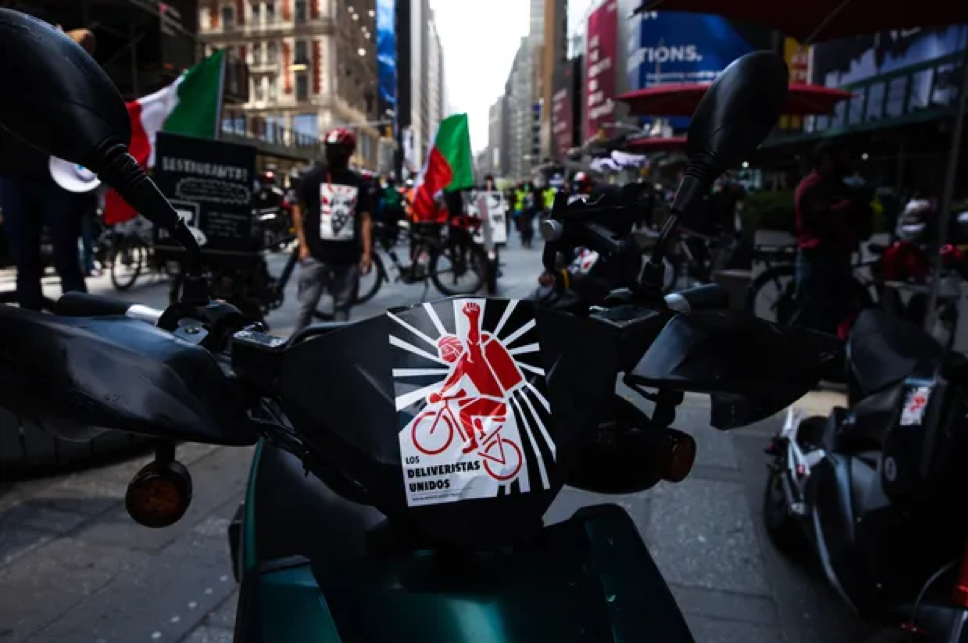While New Yorkers have been advised to stay at home during the pandemic, delivery workers have become essential workers. Unfortunately, the working conditions they’ve been facing have been challenging and often dangerous. On April 21st, The City reported that over 2,000 app-based delivery workers congregated in Times Square to protest their poor working conditions.
Professor Lee from the Queens College urban studies department commented that “Delivery workers who are often recent immigrants face challenging working conditions that include rampant wage theft, the precarity of tip-based livelihoods within the demand for speedy deliveries by both customers and employers, navigating unsafe streets, and experiencing robberies and assaults on the job.” In response to these poor working conditions, food delivery workers have begun to organize groups and protest in the streets. Los Deliveristas Unido, a group that formed in the last year, wrote on their Facebook page, “We are tired of abuse, discrimination, mugging, wrongful terminations.” Their demands include higher wages, increased access to bathrooms, and being considered employees of the tech companies they work for, not just independents. The workers also want protection from the frequent thefts and assaults they face. CBS New York reported that on March 26th, Francisco Villalva Vitinioa, a DoorDash worker, was killed after finishing his shift in East Harlem. This type of violence against delivery workers isn’t rare. Bike thefts and assaults are all too common. The recent protests have been calling for justice for Vitinioa, while also demanding better working conditions to prevent it from happening again.
Although conditions have never been ideal, they only seem to have gotten worse since the pandemic started. Delivery workers are constantly risking their lives by being exposed to COVID-19 in addition to the difficulties they already face. “It’s astounding that during the pandemic, the government has strongly encouraged people to stay home by getting essentials delivered, but the same government has yet to do anything to ensure that the workers who deliver food can use restrooms to relieve themselves and to wash their hands while working,” Professor Lee said. On top of the other issues, many workers have also been unable to access COVID-19 relief. For example, those that don’t have internet access couldn’t make vaccine appointments when the appointments were opened up to them.
The companies who employ these delivery workers haven’t done more than issue vague statements. DoorDash released a statement following Vitinioa’s death that expressed their condolences, but the company did not acknowledge the fact that Vitinioa’s working conditions were a contributing factor to the incident. Unfortunately, these businesses can’t and won’t change the way their delivery workers are treated. “The business model of delivery app companies is predicated upon keeping costs low for customers and partner restaurants by lowering wages for delivery by recruiting as many workers as possible to wait around without getting paid until they get an order. This model only works if they deny their workers the essentials of basic working conditions of employees by treating the delivery workers as ‘independent contractors,’” Professor Lee said. “These companies haven’t done anything significant or sufficient because their business model would fall apart.”In response to the protests, there have been a few legislative changes. Gothamist reported that the City Council proposed a package of six bills intended to improve the working conditions of food delivery workers. They explain that the bills would require restaurants to allow workers to use their bathrooms, let workers set a maximum delivery distance, and provide them with delivery bags, among other things. There’s no guarantee that these changes will significantly improve the working conditions of delivery workers, but these small changes may reduce the hardships they face. Ultimately, to truly improve working conditions for food delivery workers, the tech companies that employ them have to be willing to change.











